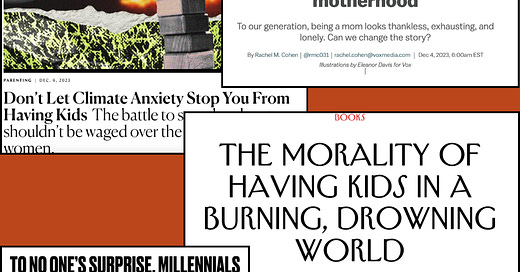No reason is reason enough
"I just don't want to" is overlooked as a valid reason to not have kids
Maybe it’s just due to the publications I read and the writers I follow, but the past few weeks seems to have been a popular time to write about the so-called problem of less women choosing to have kids. There was a piece in The Cut, Vox, and The Meteor, to name a few, all preceded by an essay/review of two books on motherhood in The New Yorker. (I was glad to see that The Parenthood Dilemma was positively reviewed, because it’s a fantastic, well-researched, insightful book by Gina Rushton.) Many of these articles were in response to another.
The Cut’s “Don’t Let Climate Anxiety Stop You From Having Kids” was a little bit of a frustration, if I’m being honest. In it, the author takes others’ decision not to have children as a personal affront. She seems to feel judged for having kids by those who have decided not to due to concerns related to climate change. She likens this to eating a cheesesteak across from a vegan. And it was that analogy that really struck a cord with me, because I am vegetarian. As any vegetarian knows, somehow our personal choices are viewed as a judgement of every other person’s diet decisions. Personally, I don’t even think about what other people are eating — it’s their business and it’s definitely not mine. Maybe I came to this conclusion because I often need to field questions about why I don’t eat meat and feel judged myself.
An so when this analogy was used, my ears perked up. Why would I judge a woman who does want a baby? I wouldn’t, just as I wouldn’t judge someone for not having one.
But more than that, why would we need to know their reasons? One explanation is that the questioner wants to know if she’s doing something wrong, or is being judged in some way. It stems from some kind of insecurity. Often child-free people will turn the question about why they don’t have children back on itself: why do you want kids? While I agree that the decision to have children probably deserves a lot more consideration than many people give it, asking people to explain their choices can be intrusive and judgemental. Why don’t we just stop?
And then I read The New Yorker piece again.
In a 2021 Pew survey of childless adults who say they likely will not have children, only five per cent specifically named climate change as the crucial factor, with an additional nine per cent citing “the state of the world.” — The New Yorker
These surveys annoy me, because what if the reason is just “I don’t want kids”? Since I began researching this topic, I find time and again that everyone seems to be searching for an explanation for why some women simply don’t want to be pregnant, go through childbirth, and spend the rest of their lives caring for another person. To me, it’s not really all that baffling. It’s a massive responsibility, and if we now have the means and opportunity to not do it, why would we expect every person to still choose it? A whopping 56% reported that they do not want children.
Time and again, we overlook the fact that some people simply don’t want to have kids and it is driving me bananas. I believe that this is a root cause of the abortion debate in the United States, and probably elsewhere in the world, because people are still operating under the assumption that women are meant to have children. Our bodies might be designed for it, but it doesn’t mean it’s a necessity or a desire.
A few years ago there was a flurry of news about the declining birth rate in the United States, and I pitched Ms Magazine on an article about exactly this topic: maybe the declining birth rate is due to more women choosing lifestyles other than motherhood. The evidence was overwhelming, in my opinion. Many governments across the world had implemented policies to encourage growing families, and they had all yielded disappointing results. My pitch was declined because the editor worried it would distract from the real need for family policies in the US to support women who did want children and felt they couldn’t afford it (I’m paraphrasing).
I think this approach is counterproductive. It creates a dichotomy for no good reason, and yet it happens time and again. The child-free movement often belittles and teases mothers who are ‘all in,’ as if they’ve made a lesser choice. At the same time, the author of The Cut piece claims that childless women don’t care about the future because they’re not leaving any children behind. I’d like to see the evidence for this. Child-free women say they are carefree because they don’t have to worry about childcare when they go out for an evening, or check with anyone else when they book a vacation — not because the Earth is on fire and they’ll be long gone before the worst of it. In fact, in my experience child-free people who cite climate change as a reason for not having kids say it’s because they don’t want to contribute to the drain on the planet; they’re trying to help, to not leave it in shambles for others’ kids.
By pitting ourselves against each other and demanding explanations, we overlook choice. And we are living in a world where recognizing this choice — in all its forms — is increasingly critical.






